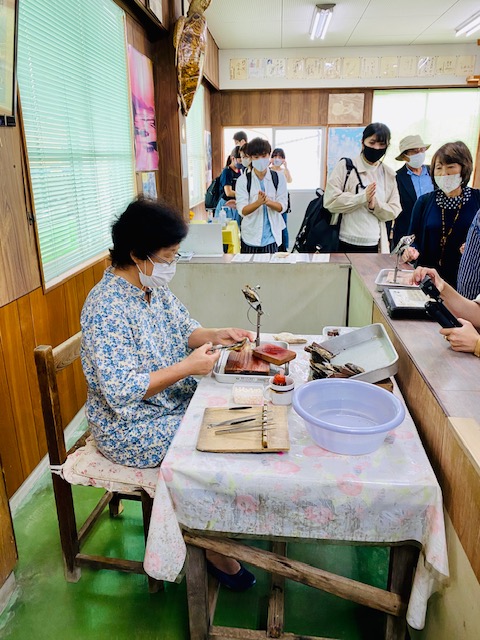A regular reader of this column who lives in New York, wrote to ask if I could write about “retired life in Japan.”
She has a Japanese friend who was telling her about his parents who are in their 80s and how active they stay with exercise and activities, socializing, and enjoying life in general. Gloria commented, “they are doing great, seem happy, and healthy, and look forward to each day. Their daily lives appear to incorporate what we humans thrive upon — socialization (not isolation), exercise, stimulation, and self-care.”
It sounds like Gloria’s friend’s parents are certainly enjoying their golden years and have created a nice retirement life for themselves. Unfortunately, such a life for many Japanese retirees is getting more and more difficult to achieve in recent years. A good percentage of Japanese retirees are finding that their pensions are not enough to live on and many have resorted to earning extra money to supplement their pension by doing menial, low-paying jobs that are rather unstable and often times physically demanding.
Some of these jobs include custodial work, traffic flaggers in construction zones, or working as security guards. This is partly due to the nation’s chronic labor shortage in a country with one of the highest percentages of longevity in the world.
The Japanese government is quite worried about how to combat the low birth rate coupled with the fact that people are living longer now than ever before in Japan. The pension system will have to be changed somehow to maintain solvency to provide for the elderly who are living longer and longer. If there aren’t enough young people paying into the system to support the older pensioners, eventually the money will run out, and then what?
One solution has been for the government to encourage retirees to keep working past the traditional retirement age of 60. Most Japanese companies set their mandatory retirement age at 60, but in 2013 a law was revised which allows workers to work until the age of 65, which is when one is eligible to receive pension benefits from the government. In 2021, the law was further amended to encourage companies to allow workers to work until the age of 70, even if that means reassigning them to other tasks within the company or organization, more suited to their age and skill set.
I know at the university where I am employed, we have a mandatory retirement age of 63, but are allowed, as a rule, to continue working for two additional years but at a reduced salary. The compromise is that we do not have to serve on any committees and we basically get to keep our university offices and just teach our courses. Most universities follow this same system but most allow faculty to teach until 65, with the reduced salary configuration until 67, then many professors opt to teach as an adjunct or part-time teacher until the age of around 70. So, in a year I will be 63, and I will be semi-retired, so to speak, with a reduced salary but with my same course load — but no extra departmental work on committees or any additional administrative work. Since I enjoy teaching students, I expect to then teach to at least the age of 70 as a part-time professor. This is all dependent upon my health, of course.
I have my own theories as to why retirees are working long past retirement age in Japan, besides merely wanting or needing to supplement their income. Traditionally, the oldest son nearly always came back home to the family house and took care of his aging parents after working away for a number of years. The trend today is for children to relocate permanently near their work, so coming back to the family home isn’t considered as seriously as it once was. The son may offer for the parents to relocate closer to where he settled with his family, or to live together, but often times the parents prefer to stay in the area where they have always lived rather than being uprooted and moved to a completely new place. And can you blame them? It would be very disruptive to say the least. Also, other siblings and their families may still be in the general area.
But living independently means there are more living expenses that are incurred and while Japanese people are known for being voracious savers, this added expense of maintaining a separate household from one’s children can deplete a savings nest egg rather quickly, forcing these elderly people to try to find work to make up the difference and to make ends meet. Just like in the U.S., inflation has been an issue In Japan and daily living expenses have increased along with the costs of normal goods and foodstuffs. Thankfully, the Japanese healthcare system allows for easy access at a reasonable cost, and prescription medicine is very nominally priced, but it all adds up causing financial stress on some of the elderly.
I have noticed in the high-rise condo where I live that a goodly portion of the units are inhabited by elderly people. Likely a decision was made to sell the family home due to the upkeep of the house and yard, and with no adult children willing to move back home, the best option was to move into a condominium that has no outside maintenance and allows for a more modern, safe (e.g. barrier free) lifestyle that usually has shops and stores nearby to buy daily necessities. The parents can stay in the same general area, but have a more comfortable life living on their own, independently, rather than being forced to move to an unfamiliar place far away. However, living in a high-rise can be very isolating and lonely, too. Elderly people have to make an effort to interact with others to avoid becoming hermits. Working part-time somewhere allows them to have social interactions with others, which relieves their loneliness and keeps them active, both physically and mentally.
Another theory I have is that Japanese people really don’t like the idea of “retiring.” In the U.S., people count the days until they can retire and look forward to the day when they are no longer obligated to work. Huge retirement parties are held, with people congratulating the person who “gets to retire.”
In Japan, while people are celebrated and recognized as they retire from their workplace, the mood is not as jovial and fun as it is in the U.S. So, while there are many elderly people who must continue to work out of a financial necessity, there is a percentage of Japanese retirees who continue to work merely to avoid boredom and in order to stay physically and mentally active. It is true, that in the U.S., some people who retire tend to have more health issues by being more sedentary than those who stay physically and mentally active by doing some sort of work or hobby after retiring.
Also, despite the belief in the West that Japanese society has such an esteemed and high respect for the elderly — which it does (to a certain extent) — there is some noticeable discrimination that does occur due to a person being of an advanced age. A friend’s mother recently wanted to change her apartment to one that was a bit closer to a supermarket and one which had an elevator as she is now 72 years old. He was shocked when they began to inquire about different rental units/places that were advertised; when the owner would realize her age, and that she would be living alone, they wouldn’t even show her the unit. They finally decided that his sister’s husband would actually rent the apartment officially in his name as he is still gainfully employed, and she will live there. The application was then accepted by the owner with this change.
It is common practice here that once a person reaches a certain age that it becomes more difficult to move residences if renting alone, because of the fear that the person may need assistance, or become incapacitated, or worse die. If the person has no close relative to take care of disposing of their belongings, there is the fear that no one may realize the person had died until bills become overdue. As morbid as this sounds, it is a real concern of potential landlords here in Japan and it is not as uncommon as one would think. Frequently, news media details an elderly person dying alone in a home and no one realized it for some time.
On the positive side, there are many upsides to retirement in Japan. Many communities offer fun and interesting activities for retirees and the elderly. Sometimes these are in the form of classes to learn a new skill or art form, like Japanese calligraphy, flower arranging, hula dancing, or karaoke, etc. Other programs allow retirees to teach a skill that they were able to hone over the length of their career, like woodworking, cooking, or teaching a foreign language.
One system I appreciate in Japan is how city governments will organize what they call “silver centers” where retirees can still impart their knowledge and expertise by being hired out to do small jobs related to the work they did professionally before retiring. I have hired handymen, landscapers, and cleaning personnel from the Silver Center to do odd jobs that needed to be done, but were beyond my ability to do them well or efficiently. I have had really good luck with them over the years because they are great to troubleshoot issues and then proceed to fix whatever it is with professional and skillful expertise. The price is usually lower than hiring from an actual company and they are dependable, on time, tidy, and enthusiastic, usually. Occasionally, you might get a curmudgeon!
As my impending retirement approaches, I guess I have adopted a more Japanese attitude towards that eventuality. While I am looking forward to having more free time for pursuing some of my own interests like writing and traveling, I do fully expect to continue teaching in the classroom as I really do enjoy that aspect of my job. Will I celebrate? Heck yeah, I am American after all, but the celebration will be short lived as I will continue doing what I have become accustomed to doing over the past 35 years — teaching students.
Get the most recent Shelby County Post headlines delivered to your email. Go to shelbycountypost.com and click on the free daily email signup link at the top of the page.




.jpg)

